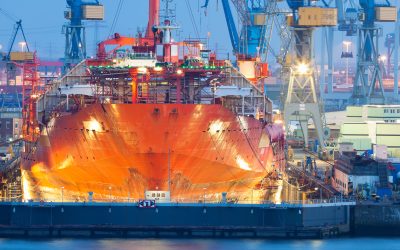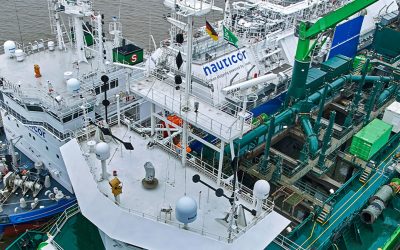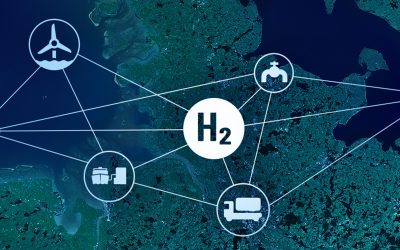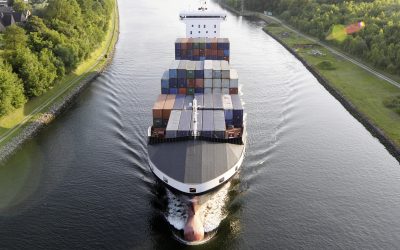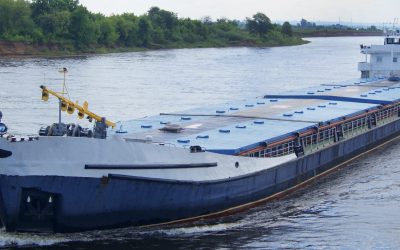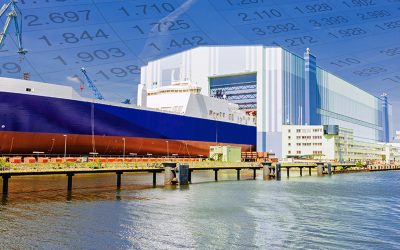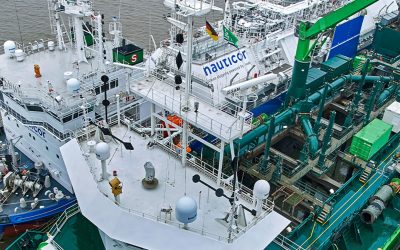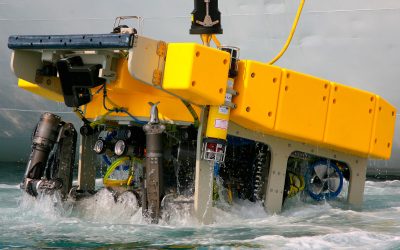
Kapt. Runa Jörgens
Leiterin Themen und Projekte/Referentin Schifffahrt
Telefon: +49 40 9999 698 - 71
E-Mail: Joergens[at]dmz-maritim.de

Gunther Zeitzmann
Research Coordinator Regulations and Standards
Phone: +49 40 9999 698 – 72
E-Mail: Zeitzmann[at]dmz-maritim.de
The use of climate-friendly hydrogen and its derivatives (methanol, ammonia, e-liquid natural gas and e-diesel) will become necessary in order to achieve both national[1] and international[2] climate targets.
In addition to renewable electricity, hydrogen and hydrogen-based fuels will be the most widely used energy sources in the medium term. The use of these alternatives to fossil fuels makes sense from an ecological point of view. Those who create the necessary infrastructure for hydrogen at an early stage will gain a competitive advantage here. This topic is being discussed intensively in industry and politics. The first projects have already been planned and are underway.[3]
There is no question that the maritime sector, as a means of transport (ships) and distribution (ports), has a special role to play in supplying Germany with hydrogen and hydrogen-based energy sources.[4] In this respect it contributes not only to maritime sovereignty, but also to national sovereignty.
However in this discussion, it is often overlooked that the maritime industry in Germany also wants to use alternative fuels. It is therefore expected to be a user of hydrogen (or its derivatives) as well. To achieve this, it is necessary to know which hydrogen technologies are to be used in the maritime sector and what quantities of hydrogen or hydrogen-based energy sources are likely to be required.
Study
In order to determine this demand, the German Maritime Centre has commissioned Ludwig-Bölkow-Systemtechnik GmbH to conduct a study to determine which hydrogen technologies are to be used in the maritime sector. At the same time, an assessment is to be made of the quantities that will be needed in the short, medium and long term.
The study provides an overview of applications by sub-sectors (shipping, ports, shipbuilding and suppliers, marine technology) and estimates the quantities of hydrogen needed in each case.
The survey indicates the amount of hydrogen required for the maritime sector, thus contributing to an even better estimation of the necessary demand for hydrogen (and its derivatives) for the German economy.
Unlike in the past, the maritime sector will not rely on a separate energy source (heavy oil). In the future, maritime shipping in particular will become a competitor to other users, i.e. other industries and modes of transport, in the distribution of hydrogen or its derivatives.
The study concludes that Germany’s maritime sector will have a long-term demand for more than 3.5 million tonnes of hydrogen or hydrogen-based fuels per year.
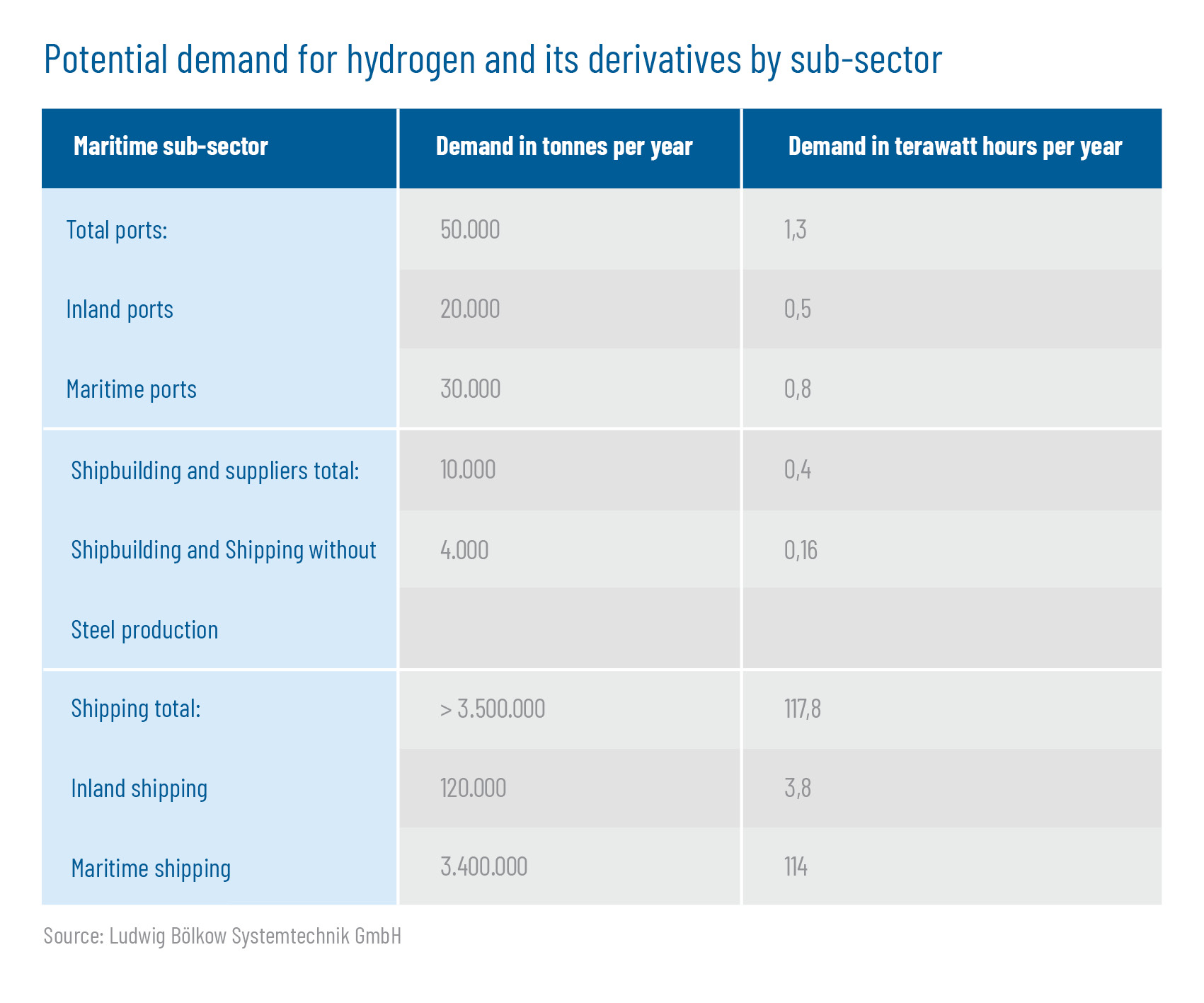
The demand will not be exclusive to Germany. The German merchant fleet[5] will have to meet its demand internationally, depending on the trading areas of the respective ships. The same applies to the international merchant fleet (which will want to bunker in German ports). The projection can therefore be helpful in calculating the bunkering supplies of hydrogen and hydrogen-based fuels that may have to be kept in German seaports.
As mentioned at the outset, large quantities of hydrogen or hydrogen-based fuels will arrive in Germany by ship via German ports. To establish a bunkering infrastructure for hydrogen-based fuels, German ports must further establish themselves as energy hubs for hydrogen and hydrogen-based fuels. A side effect of this is likely to be the transition of port handling equipment to hydrogen-based fuels.
Looking ahead
The maritime sector will take on a new and central role in the energy market as both a user and distributor of hydrogen and hydrogen-based fuels. Without it, the energy transition in Germany will not succeed.
Internationally, the German maritime sector can act as a pioneer through its innovative strength, especially in the maritime supply industry. German suppliers have the capacity to further expand their position in the development of climate-neutral propulsion systems. The export quota of the German supplier industry is over 75%.[6] The most important foreign sales markets are the EU, followed by China, North America and South Korea.[7] Another key player is the German merchant fleet, which is the fifth largest in the world with about 1700 ships[8], and will be converted to climate-neutral propulsion systems.
To harness the opportunities presented by the transition of shipping to climate-neutral propulsion systems and the expansion of German ports as energy hubs, a joint strategy of all maritime stakeholders is required. Such a strategy, along with further coordination with other industries and sectors, has the potential to make the maritime sector a driving force for the substitution and distribution of alternative energies.
The German Maritime Centre, as an a link between industry, science and administration, is ready to support and facilitate this process.
1] Achieving greenhouse gas neutrality by 2045; source: https://www.bundesregierung.de/breg-de/schwerpunkte/klimaschutz/klimaschutzgesetz-2021-1913672, accessed 19.07.2023. [2] Achieving climate neutrality by 2050 at EU level; source: https://www.bundesregierung.de/breg-de/schwerpunkte/klimaschutz/eu-weite-und-internationale-klimapolitik#:~:text=Die%20EU%20hat%20sich%20das,Zielen%20des%20Klimaschutzes%20zu%20orientieren, accessed 19.07.2023.[3] https://bmdv.bund.de/SharedDocs/DE/Artikel/K/62-wasserstoff-grossprojekte.html, accessed 20.07.2023.[4] See also: https://dmz-maritim.de/wp-content/uploads/2022/05/Studie-Wasserstoff_2021.pdf, accessed 19.07.2023.[5] Data basis for this are the statistics of the Federal Maritime and Hydrographic Agency https://www.bsh.de/DE/THEMEN/Schifffahrt/Deutsche_Handelsflotte/_Anlagen/Downloads/Statistik-Fortlaufend.html;jsessionid=C1775F6BF58F5748ECDA44DFEB589D86.live11292?nn=1653196.[6] https://www.bmwk.de/Redaktion/DE/Artikel/Branchenfokus/branchenfokus-maritime-wirtschaft-03.html, accessed 20.07.20323.[7] Ibid.[8] https://de.statista.com/statistik/daten/studie/28524/umfrage/welthandelsflotten-nach-der-nationalitaet-des-eigners/, accessed 20.07.2023.

